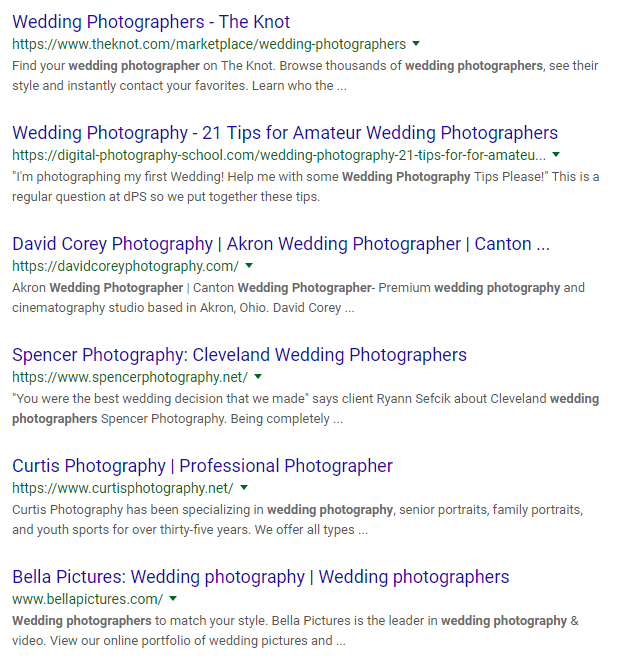If I asked you who your competitors are, you could probably name two or three without blinking.
But what if I told you that they may not really be your competition? And that there are other “competitors” out there that are a far greater risk to your online success?
That’s crazy talk, right?
Maybe not.
When you think about your competitors, you probably think of those in the same space as you in terms of the product or service you sell.
And yes, that is your competition.
But when it comes to the web, unless those competitors are filling the first page of results for relevant keywords, they may not be your true competition at all.
The companies, businesses, blogs, tweets, social profiles, directories, etc., that dominate the first page of results are the real competition – even if they do not actually compete with you business-wise.
Anyone occupying the search results space that you have your eye on is who you’re competing against for that space.
Say you have an impulse-buy product that you want to sell at the local supermarket. Your product is not a candy bar, package of gum, or a magazine, but you know that the checkout lane is the best place for you to present it.
So even though those products are not your direct competition, you are competing for those three feet of real estate in the checkout lane.
That’s Page 1 of Google!
Organic Non-Competition Competition
It’s inevitable that your business category competitors will rank for many of the same keywords as you.
But so will a lot of other websites that have created content around and within your business category, such as informational and DIY sites or blogs.
Much of that content will rank for the same phrases you’re after. While you may not be competing with those websites for dollars, you’re definitely competing with them for audience access.
Let’s look at an example using the search phrase “wedding photography.”
Just looking at the first set of (my) results, you see several wedding photographers, as you would expect, but also a photographer directory and blog post for wedding photography tips.

Because these non-competitor competitors are taking these coveted top positions, your job is to figure out how you’re going to unseat them.
Of course, it doesn’t matter who you unseat, but the fact is… somebody has to go in order to make room for you!
The first tool in your arsenal is good old-fashioned SEO:
- Perform keyword research.
- Create quality content that thoroughly covers the topic implied by the search term.
- Optimize your SEO title, meta description, URL, and image alt tags.
Beyond that, you need to be hyper-focused on searcher intent.
You should always be optimizing for searcher intent, but in this situation, it takes on extra significance.
You have to get into the mind of the searcher: Are they looking for a photographer, or do they want tips or general information?
Run searches on your own keywords and see what you find.
If you find that the query isn’t producing results similar to your business, you may need to go after different keywords or for more specific, long-tail phrases.
For instance, maybe you should be optimizing for “wedding photographers in [your city]” instead. That may or may not change the nature of the competition, but you’ll generally find the competition to be less fierce.
Social Media Non-Competition
 Search engines aren’t the only place where you’ll run into nontraditional competitors.
Search engines aren’t the only place where you’ll run into nontraditional competitors.
When it comes to social media, I dare say that the competition is much stiffer because you’re not just competing with other businesses, you’re also competing with “content” from your audience’s friends and family.
On top of that, social media networks are adjusting their algorithms in a way that likely gives you less reach rather than more.
Bottom line: If your audience doesn’t engage with your content, good luck getting your social posts seen… unless you pay for it.
How do you compete with that?
By creating engaging social media content.
You need to be producing content that your audience wants to see in their stream.
For the most part, people are on social media to be entertained and informed. They are not there to be sold to, except in the rarest of circumstances. And that usually only comes after a comfortable amount of engagement.
You can compete on social media by providing interesting, entertaining, informative, and useful content.
For instance, if you are a wedding photographer, you might include posts about wedding day tips or memes about the craziness of wedding planning. This type of content is far more likely to be read, shared, and even commented on.
You can also ask questions that encourage interaction, such as “What’s your favorite wedding movie?”
More than anything, people want to engage with something real.
If you’re just out to promote your business, your social media game is gonna get beat by the hip granny that recalls stories of her children getting married. In short, be fun, be human, and be engaging.
Overcoming Your Non-Competition Competition
We live in a digital world.
Your “competition” is no longer just those you’d consider a traditional rival.
Your online competition can include companies half a world away, a little old lady down the street, or a blogger working from his mom’s basement at night.
The key to competing in the digital world is to stand out.
That may be simple – but it isn’t easy.
Beating this online competition first starts with recognizing it.
If you have your sights set somewhere else, you can’t be surprised when you’re not getting the results you want.
Your audience isn’t just in your industry. It’s not just in search. Not just in social media.
It’s everywhere.
It’s anyone that is filling the space you want to be, and anything that is grabbing the attention of the audience you want.
Once you have your proper sights set, start creating the type of content that is working for them – but do it better. Look for the things no one else is doing that your audience wishes someone was – and make that someone you!
And finally, beating your competition means finding creative ways to engage with your audience. Your content is just a starting point, but what you do from there makes all the difference.
All told, you can only understand your competition by understanding your audience and targeting them effectively. Which all comes down to listening for what they want and delivering that in spades.
More Resources:
- SEO Competitive Analysis: The Definitive Guide
- Think You Know Who Your SEO & PPC Competition Is? Think Again!
- 4 Important Competitive SEO Data Points You Should Always Watch
Image Credits
Featured Image: Pixabay, modified by author
In-post Image #1: Screenshot taken by author, May 2019
In-post Image #2: Pixabay





